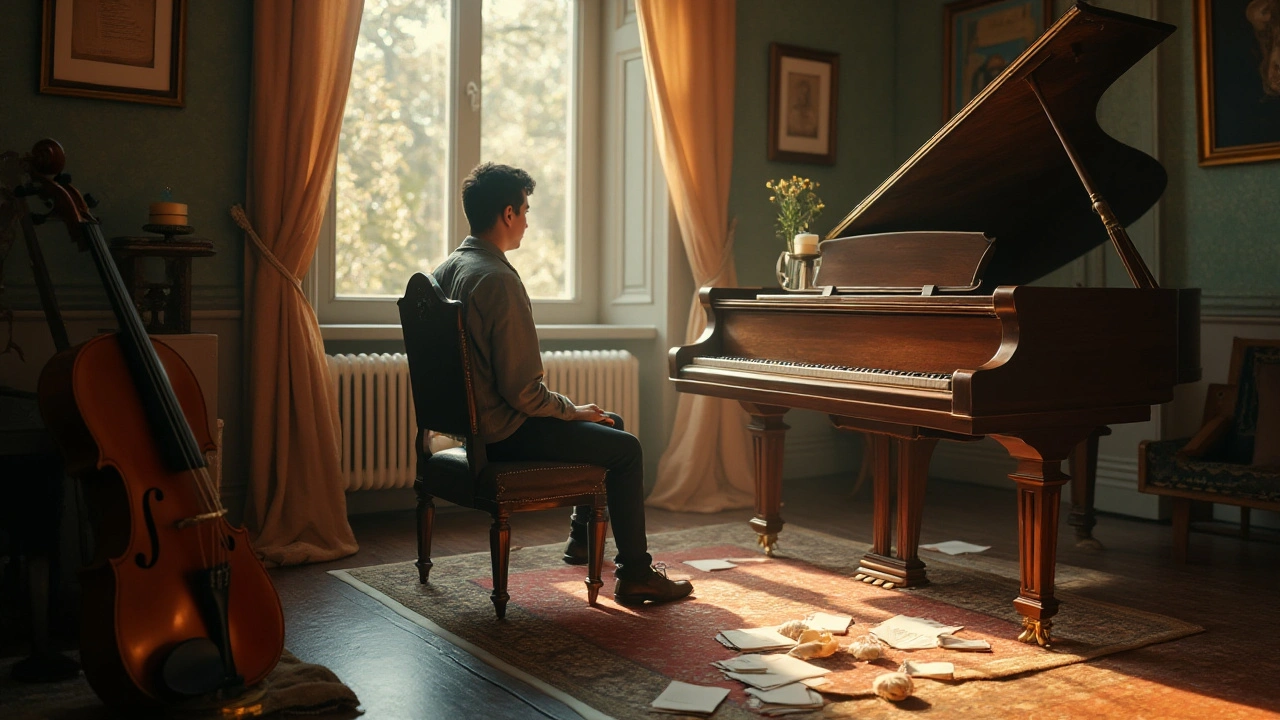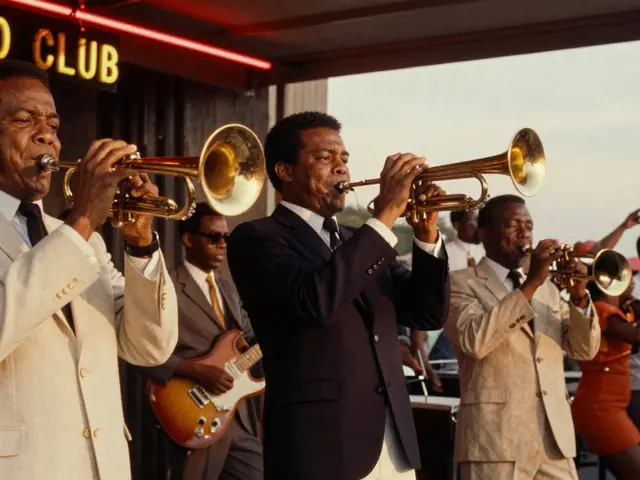The world of music offers a vast spectrum of styles, but classical music stands apart with its ability to touch the soul in profound ways. Originating in the traditions of Western art music, it encompasses compositions that have stood the test of time, each with the power to transport listeners to different realms of emotion and thought.
Consider how a single symphony can conjure vivid imagery or evoke deep-set emotions one might have tucked away. There is a unique magic in its melodies and rhythms that invites introspection and tranquility. Beyond its beauty, classical music interacts with the human mind, offering healing properties that science and tradition both recognize.
In this article, we delve into the emotional impact of classical music, exploring its historical roots and unravelling scientific insights into its effects on our mental well-being. We will also discuss practical ways to make classical music a part of your everyday life for greater emotional health.
- The Emotional Impact of Classical Music
- Historical Significance and Influence
- Scientific Perspectives on Music and the Mind
- Incorporating Classical Music into Daily Life
The Emotional Impact of Classical Music
Classical music holds a unique sway over our emotions, a power that transcends cultural and generational boundaries. Its impact on our feelings can be attributed to the complex structures and emotive power embedded in its melody and harmonies. Take Beethoven’s symphonies, which are renowned for their capacity to elicit a vast array of feelings—from the excitement of triumph to the serenity of introspection. A study published in the Journal of Neuroscience discovered that listening to classical music can activate different regions of the brain associated with emotion and memory, similar to the response of emotional stimuli. This shows just how intertwined our thoughts and feelings are when it comes to music.
One of the most fascinating aspects of classical music is its ability to create and sustain a deep emotional impact without words. It harnesses the power of instruments alone to convey narratives and paint landscapes of feeling. This is especially evident in the works of composers like Chopin and Schubert, whose pieces often reflect an emotional journey. Listening to Chopin's Nocturnes, for example, evokes a gentle melancholy and introspection, creating a space for listeners to explore their own emotional landscape in a non-verbal dialogue. This ability to touch the core of human emotion is what makes classical music a profound therapeutic tool in modern therapy.
In fact, many music therapists use classical music because of its potential to heal emotional scars and improve mental health. A quote by Oliver Sacks, a well-regarded neurologist, beautifully captures this:
"Music can lift us out of depression or move us to tears – it is a remedy, a tonic, orange juice for the ear. But for many of my neurological patients, music is even more – it can provide access, even when no medication can."Sacks’ insights underline the extraordinary capacity of classical music to act as a powerful emotional conduit, where words might fail. In serene moments, this music can be both an escape and a companion, providing solace in shared human emotion.
The role of classical music in enhancing emotional intelligence is not just anecdotal; it's supported by increasing streams of research. Studies suggest that exposure to the rich textures and intricate harmonies found in classical compositions can increase one's ability to perceive and interpret the emotions of others. This emotional acumen can lead to deeper empathy and improved social interactions, illustrating how music's impact extends beyond the personal and into the relational.
Moreover, the emotional impact of classical music often continues long after the final notes have faded away. Many listeners report that it encourages a reflection on personal experiences, helping to deepen their understanding of the world around them and their place within it. The act of listening itself becomes a meditative process, fostering a heightened state of awareness and introspection. For those seeking to enhance their quality of life, engaging with classical music regularly can offer a remarkable addition to their emotional toolkit, providing them with a deeper sense of peace and resilience.

Historical Significance and Influence
Classical music, a cornerstone of Western culture, has played a critical role through centuries of human history, evolving alongside the society it both influenced and mirrored. From the elegance of the Baroque period, with its interwoven textures and ornate melodies, to the bold innovations of the Romantic era, classical music has shaped and been shaped by the eras in which it was created. During the Age of Enlightenment, classical music became a symbol of intellectual and aesthetic refinement, with composers like Bach and Handel casting a profound influence on the cultural dynamics of Europe. Their compositions not only provided entertainment but also served as a reflection of the intellectual movements of their time.
The dichotomy between the deeply emotional works of Beethoven and the delicately structured compositions by Mozart illustrates the diverse nature of classical music and its capacity to express the spectrum of human emotion. This genre did more than entertain; it provided a soundtrack to revolutions and was a medium for political commentary. Consider how Beethoven’s 'Eroica Symphony' was initially dedicated to Napoleon Bonaparte, capturing the spirit of revolutionary France, only to have that dedication rescinded when Napoleon declared himself emperor. This act itself highlights how music was an active participant in historical narratives.
In the 19th century, Richard Wagner revolutionized operatic music with his leitmotif approach, where recurring musical themes would be associated with particular characters or ideas. This concept not only invigorated the opera but also went on to influence contemporary film scores. His work was emblematic of how classical music was not just a spectator sport but an evolving art form that constantly sought new expressions. As music evolved into the modern era, traces of its classical origins remained embedded in new genres, bridging past and present with ease. Debussy’s impressionistic compositions shifted the focus from traditional tonal forms to more fluid constructs, preluding the modern musical landscape.
Today, the grid lines of classical music trace a lineage of tradition and innovation that continues to captivate listeners worldwide. As Maestro Leonard Bernstein once aptly put,
"The key to the mystery of a great artist is that he returns us to simplicity."This is evident as more contemporary genres often incorporate classical elements, whether through the sampling of a Chopin nocturne in a pop ballad or the orchestral arrangements in a film score.
The historical significance of classical music is both vast and profound, perceivable in its enduring influence on music, literature, and art, carving a path for ongoing creative exploration. Whether through the mimicked complexity in modern jazz or the emotive heartbreak of an indie song, classical music’s hallmark can be discerned, bridging historical periods with resilience and charm. Recognizing classical music’s pivotal role in cultural history encourages not only a greater appreciation of the genre itself but also provides insights into the enduring human spirit and its longing for expression.

Scientific Perspectives on Music and the Mind
Classical music is not just a feast for the ears; it's also an intricate tapestry that influences our brain in remarkable ways. Scientists have long been fascinated by how classical music can unlock corners of the mind that are usually untapped, providing mental clarity and boosting cognitive functions. One study suggests that listening to Mozart can temporarily enhance spatial-temporal reasoning, a phenomenon coined the 'Mozart Effect.' This, in turn, encourages deeper understanding and better problem-solving skills. Interestingly, it's not just the complex structure of this music that benefits us, but the emotional journey it takes us on that can lead to a state of increased relaxation and stress reduction.
Our brains react quite uniquely to classical music. MRI scans have shown heightened activity in areas involved in memory retrieval and attention maintenance when classical melodies are played. Fascinatingly, these musical vibrations can almost seem like a workout for the brain, leading to enhanced neural connectivity, which is the basis for improved brain health. Listening habits have demonstrated that regular engagement with classical compositions can help stave off degenerative memory diseases, such as Alzheimer’s, by increasing neuroplasticity. For the modern-day listener, this is an invaluable insight, offering a non-invasive method to maintain mental fitness through delightful auditory experiences.
“Music and the brain have a profoundly important relationship; music can enhance emotions and introduce a spectrum of feelings that can lead to creative problem solving.” — Dr. Oliver Sacks, renowned neurologist.
The scope of classical music’s benefits extends far beyond cognition. The emotive power of its melodies, harmonies, and rhythms can have therapeutic effects on our emotions, naturally and subtly altering our mood and reducing anxiety levels. There’s something about the symphony of notes that can echo the vast range of human emotions in a way that words often cannot. In therapy, music can serve as an emotional bridge, allowing individuals to express complex feelings that they might struggle to verbalize. It is hence no surprise that music therapy is increasingly being adopted in mental health treatments, leveraging these hidden powers of music to bring about emotional healing.
As research continues, more light is being shed on the profound impact of classical music on the brain. The acoustic elements and time signatures engage both hemispheres of the brain, fostering a balanced mental state. With findings like these, it’s clear that music is so much more than just an art form; it’s a vital component in holistic well-being. Whether through aiding concentration, enhancing emotional regulation, or even boosting our enjoyment in life's simple moments, the benefits are far-reaching. For anyone seeking a natural way to improve their state of mind, the inclusion of classical music into daily life seems both a practical and pleasurable pursuit.

Incorporating Classical Music into Daily Life
Stepping into the world of classical music can be both exhilarating and daunting, but incorporating it into daily life need not be a chore. Whether you're a long-time aficionado or a mere beginner, weaving its harmonious notes into everyday activities can turn the mundane into moments of peace and reflection. Start by identifying parts of your day where music can serve as a comforting background or even the main attraction. Morning routines, for example, can be significantly elevated by a symphonic overture, easing the transition from sleep to alertness with its swelling crescendos setting the tone for the day. In the evening, a soothing adagio might provide the perfect lullaby to unwind. Experiment with different composers and styles to match your mood and activities.
One way to introduce transformative power of classical music into your life is through curated playlists. Platforms like Spotify and Apple Music offer an array of pre-compiled collections that reflect different themes and moods. You can explore playlists crafted for relaxation, concentration, or even exercise. If you prefer a personal touch, create your own. Think about including works from masters like Bach, whose compositions are said to improve focus, or Tchaikovsky for a more emotive experience. Adding some contemporary classical pieces can also introduce variety while keeping you attuned to modern adaptations of this timeless genre.
Beyond personal enjoyment, consider how classical music could enhance communal spaces and activities. Hosting a dinner party? A backdrop of soft piano concertos might just be what elevates the ambiance, creating an inviting atmosphere where conversations flow effortlessly. Consider tying in historical knowledge about the pieces, which can be an engaging ice-breaker and deepen appreciation among your guests. Simple exposure to classical music in such settings can organically foster a shared interest and understanding of its emotional language, even among those who may not have consciously engaged with it before.
Some might wonder about its scientific benefits. It's well-documented that exposure to music therapy involving classical tunes can aid relaxation and reduce anxiety. These melodies tend to calm the autonomic nervous system, lowering blood pressure and reducing heart rate. Why not integrate this practice during stressful hours at work or school? Having background classical music can create a serene environment conducive to creative and focused output. In fact, a study published in 'Nature' indicated that background music significantly impacts cognitive performance, painting a compelling case for making it a staple in educational and professional spaces.
"Music is the shorthand of emotion." - Leo TolstoyTolstoy's words resonate deeply due to the truth nestled within them. Implementing classical music into our daily lives can subtly shift our emotional landscape. Try making it part of your routines in very deliberate ways. A quick method is linking it to meditation practices. As you sit in stillness, let works, perhaps by Debussy or Mozart, guide your breath and thoughts toward tranquility. Over time, their intricate harmonies can become cues for mindfulness, bridging the gap between initial stress and eventual calm.
Implementing classical sounds today can be as simple or complex as you wish. It can be personalized or community-based, rich with serene and practical benefits. Classical music is more than notes and rhythms; it's a tradition of emotionally powerful expressions woven through history. Make it your own companion; its embrace offers endless possibilities.






